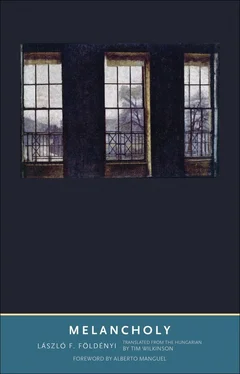Kant was unable to solve the ultimate riddle of the human soul. Autonomy , toward which a morally minded human should be striving, is not able to become omnipotence —and the inevitable schematism, which is a necessary concomitant of the human mind, is also a source of a melancholic’s despondency. On the one hand, everyone is a unique, irreplaceable, autonomous personality, but on the other hand, everyone is subject to the same destiny, a fate that pushes the personality toward a common death — do we need another reason for sorrow? In a treatise entitled Observations on the Nature, Causes, and Cure of Melancholy (1780), Benjamin Fawcett wrote: “It is impossible for any one to ascertain his perpetual freedom from it; whether he be high or low, rich or poor, virtuous or vicious; no, not the most gay and cheerful. . As is the good, so is the sinner; and he that sweareth, as he that sweareth an oath. This is an evil among all things that are done under the sun, that there is one event unto all” (7). From the viewpoint of the modern conception of melancholia, the late eighteenth century brought a decisive change: a fateful drive for individuality and a growing uniformity, which were not just sociopolitical but also anthropological factors (for example, the fact that man dies and his individuality is irrevocably wiped out), confronted people who were sensitive to it with such an insoluble and distressing dilemma that they literally died of it. “I am an unspeakable person,” Heinrich von Kleist averred — an admission that directs attention to the most sensitive spot in the culture of the modern age. The development of individuality as it is now understood has meant freedom from metaphysical constraints, supposed liberation from powers “behind” man. The price of that freedom, however, has been “unspeakability”—after all, just as it is impossible to utter or imagine infinity without rendering it finite (people who speak with God are either gods themselves or about to die), so the personal freedom of the individual grows in direct proportion to the “invisible” representation of external constraints. The modern individual becomes increasingly free and infinite, yet he is bound more and more by obligations, by external constraints that make their appearance in the form of words designed to define his freedom. For the modern individual, complete freedom lies beyond words: in death, which no longer needs to be concerned with the antinomy of speakability and unspeakability. Kleist “realized” himself in death: he freed himself from the polarized contradiction of personal infinitude and social finitude , of indescribability and communicability.
It was no accident that it was in classical German philosophy, which, for all its antagonism, supported Romanticism most vigorously, that questions about individuality that had been posed in previous centuries were resuscitated. Faith in the magnificence of the evolving modern world perforce accentuated the faith in a harmonious relationship of the individual and the community (the singular and the general). Reviving a thought of St. Thomas Aquinas, Kant applied his own conceptual apparatus to sketch out the aforesaid question of autonomy, and he concluded that only a totally self-legislating will could be free. (Kleist’s heroes would later give full voice to Kant’s conviction; and if one takes those figures — together with Kleist himself — to be pathological, then one would also be obliged to discern pathological shades in a civilization that produced these kinds of excruciating conflicts.) Kant, however — although he never articulated this to himself — was led by his methodology to an antinomy and its unforeseeable attendant consequences. Proclaiming absolute freedom, and trusting in the boundlessness and unconditionality of the individual will, he hoped that a harmonious community of man could be established, but in the prosaic modern world, fraught with constraints, he was able to deliver only negative, indefinable, and unworkable proposals for the self-realization of the individual. When consistently thought through, the injunction of the categorical imperative and absolute autonomy leads to the conclusion that any earthly realization for an individual goes hand in hand with the acceptance of constraints, burdens, and self-mutilations . In proclaiming the freedom of the individual, Kant admittedly did try to resolve his aspirations for the individual in culture, that unspoken human community, but his methodology involved debunking the reality of the modern world and the inverted critique of all manner of this-worldly communities. As far as that goes, Kant was the most consistent critic of the modern bourgeois world; his epistemology, based as it was on als ob —on skepticism — contains a great deal more than that. The skepticism relates to the modern world, but the doubts about knowability and absolute certainty served, at the same time, as recognitions that life does not permit there to be definitive judgments about anything. With this postulation of the inconclusiveness of cognition, Kant raised the idea of man’s self-creation and eternal striving for perfection (to that extent, he prefigures Hegel’s philosophy and aims to lay the theoretical foundation of a fundamentally antimelancholic disposition); 3with his ethics, however, he questioned self-creation (despite having apparently reached the opposite conclusion on more than one occasion previously): the endlessness and unconditionality of individual freedom on the one hand, and associations (communities) brought into being by free individuals on the other, logically exclude each other (to that extent, he prepared the ground for Romanticism and recognized the legitimacy of the melancholic way of looking at the world).
Kant himself was to fall victim to the antinomy, or perhaps the insoluble contradiction of his theory was the manifestation of the inner conflict of his own life. For Kant rejected the “rapture” and “fanaticism” that were also responsible for melancholia, but he was so fanatical in doing so, 4and he displayed such a rapture for a rational lifestyle, that he himself was overcome with melancholia. From the pages of three surviving contemporary biographies of him (by Ernst von Borowski, Reinhold Bernhard Jachmann, and Ehrgott Andreas Christoph Wasianski), one gains the impression of a man who compressed his life into a system of rigorous rules, but whose facial features were touched by a severe melancholia. “Everyone who knew him can testify that Kant’s most characteristic quality was the persistent endeavor to proceed in everything according to well-reasoned and, at least in accordance with his own convictions, well-based principles,” von Borowski wrote. “An endeavor to set himself certain maxims in large things or small, important or insignificant alike, maxims from which it was possible to start and to which it was possible to return. Over time, those maxims became so interlaced within his innermost ego that he still acted on that basis even when he was not thinking of them” (quoted in Felix Groß, ed., Immanuel Kant , 51–52). 5But for all the positive features of that life, it did have one drawback, of which Kant himself was also aware: “Once,” von Borowski writes, “in my presence he expounded to a lady, who enquired after his health, that in point of fact he was never healthy and never sick either” (52). To feel neither healthy nor sick is an indication of a severe personality imbalance. When a sense of the elusiveness of existence takes possession of man, terror will overcome him. Nothing could be more natural than to try to escape — to flee one’s fate. The goal, however, is unfathomable: in seeking sanctuary from a threatening existence, one is bound to realize that one can count only on oneself, yet even before one can take a rest in oneself, that threatening existence falls in like a vaulted ceiling. One becomes unreliable even to oneself, and no section of one’s being is left in which one might hide for relief: the soul becomes just as unpredictable as the body. Let us not forget that the eighteenth century was a century not just of the Enlightenment but also of hypochondria, or as it was called at the time, “melancholia hypochondriaca.” Even a lifestyle regimented from top to toe was unable to protect Kant from that: “Perhaps no person has ever paid more attention than Kant did to his body and everything connected with it,” noted Jachmann (quoted in ibid., 194); while von Borowski adds: “As long as I was acquainted with him, he paid constant attention to his own body, and he willingly conversed with others about all methods by which he might preserve his health; although he never had recourse to medical assistance for himself, he nevertheless had a predilection for studying medicine, paying lively attention to its innovations and results” (53). One dismisses the complaints and perennial anxieties of hypochondriacs as imaginary physical illnesses, but an imbalance of the imagination can induce genuine ailments. One should not think only of organic diseases that hurry to meet hypochondriacs, but rather focus on disturbances of the imagination — on the reasons behind those “groundless” complaints. Such disturbances are not merely a harbinger of an imaginary, and maybe later a genuine, physical complaint, but also a sign that the hypochondriac senses that all existence has become disordered for him. Reality condenses around hypochondriacs, but as with every vortex, here, too, everything turns to nothingness beyond a certain point. Kant was not spared terror at the thought of dying: “He concerned himself with reaching a ripe old age,” Jachmann wrote. “In his mind he compiled a whole list of people who had lived to see an advanced age, he liked to invite people in Königsberg who were older and of higher rank than him, and he was happy to push ever nearer to the front and to have ever fewer older people ahead of him; for many a long year he had the Königsberg police inspectorate send him the monthly mortality list so that he could calculate his life expectancy based on that ” (quoted in ibid., 194; emphasis added). Was that a happy life? Did all that calculation make for a balanced existence? Was it able to drive the fear from him? By way of an answer, let us quote Kant himself as reported by von Borowski: “Is there anyone who has not read in his writings, or any friend who had not heard more than once from his own lips, that there were no conditions under which he would live his life again if he had to live it the same way all over again from the beginning?” (53).
Читать дальше












